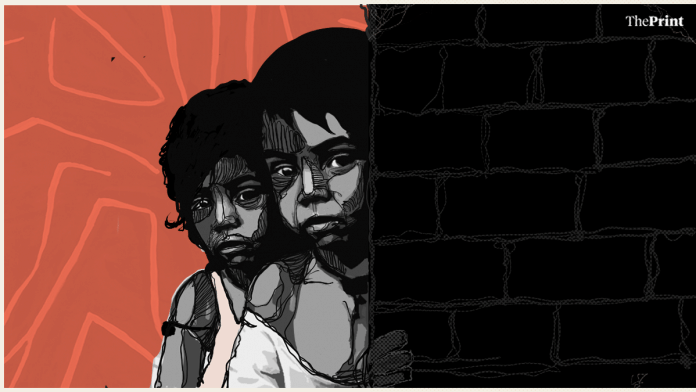New Delhi: The Union Ministry of Women and Child Development (WCD) has invited suggestions for the draft Trafficking in Persons (Prevention, Care and Rehabilitation) Bill, 2021.
The objective of the bill is “to prevent and counter-trafficking in persons, especially women and children, to provide for care, protection, and rehabilitation to the victims, while respecting their rights, and creating a supportive legal, economic and social environment for them,” the ministry said in a press release.
The bill, to be sent to the cabinet for approval before being tabled in Parliament, has increased the scope of the nature of offences of trafficking, with stringent penalties including life imprisonment, and even death penalty in certain cases.
A previous draft of the bill was passed in the Lok Sabha in 2018 but was never introduced in the Rajya Sabha.
While the 2018 bill dealt with trafficking, rescue, protection and rehabilitation of victims, the 2021 bill expands the scope to also include offences taking place outside India.
The new bill also makes the NIA the central investigation authority looking into such offences.
Here is a detailed look at the provisions of the bill and what experts have to say.
What the bill says
According to the draft bill, the law will apply to all citizens of India, within and outside the country, persons on any ship or aircraft registered in India wherever it may be or carrying Indian citizens wherever they may be, and a foreign national or a stateless person who has residence in India.
It also says the law “shall apply to every offence of trafficking in persons with cross-border implications”.
The draft bill also widens the definition of the “victim” by including transgenders, besides women and children.
Once the bill becomes an Act, the central government will notify and set up a National Anti Trafficking Committee, while state governments will set up these committees at state and district levels to ensure effective implementation.
The bill proposes that any offence of trafficking “shall be punished with rigorous imprisonment for a term which shall not be less than seven years but which may extend to ten years and shall also be liable to fine which shall not be less than one lakh rupees”.
In addition, similar to the 2018 version, the new draft proposes more severe penalties for “aggravated offences” and seeks to crack down on organised crime syndicates.
Aggravated offences include cases that may result in the death of the victim or where the victim suffers grievous injury (in cases such as acid attack), organ mutilation or removal of organs, or where the victim is a child.
“Whoever commits the offence of aggravated form of trafficking of a person shall be punishable with rigorous imprisonment for a term for ten years but which may extend to imprisonment for life and shall also be liable to fine which may extend to ten lakh rupees,” according to the provisions of the bill.
In case of the death of the victim, the bill proposes life imprisonment along with a fine of Rs 30 lakh.
The bill also proposes imprisonment upto 20 years and death penalty for the offenders found guilty. “The person shall be punished with rigorous imprisonment for twenty years, but which may extend to life, or in case of second or subsequent conviction with death, and with fine which may extend up to thirty lakh rupees,” the draft says.
The bill also says the investigation needs to be completed within 90 days from the date of the arrest of the accused.
The bill widens the range of offenders who can be booked under the law, bringing public servants, armed forces personnel or anyone in a position of authority under its ambit. Penalty for the guilty will include life imprisonment along with a fine of Rs 30 lakh.
Also read: Muslim women ‘on sale’ — website targets journalists, activists, taken down after outrage
What experts say
Experts ThePrint spoke to said the draft bill will bring in important changes. “Cross-border trafficking has been a major problem. In addition, we’ve seen attachment of property is a greater deterrent than a possible jail sentence,” said Bharat Chugh, a former civil judge and now advocate at the Supreme Court.
However, he said the draft bill also lends to confusion. “There are laws already in place on ‘forced labour’ and ‘sexual exploitation’. There is now a lot of overlapping. The law does not clarify which law is to apply. There should have been one comprehensive code, repealing all previous laws.”
Another lawyer said while Section 370 of the Indian Penal Code (IPC) deals with trafficking already, the present bill has made some improvements. “The draft bill provides for rehabilitation and prevention which was not there in 370, economic sanctions and treating them under PMLA are also improvements,” said Amit Anand Tiwari, advocate, Supreme Court.
“However putting the burden on the NIA is not ideal as it is already thinly manned,” he added.
Also read: Beware of traffickers: Social media posts seeking adoption for ‘Covid orphans’ raise concern






